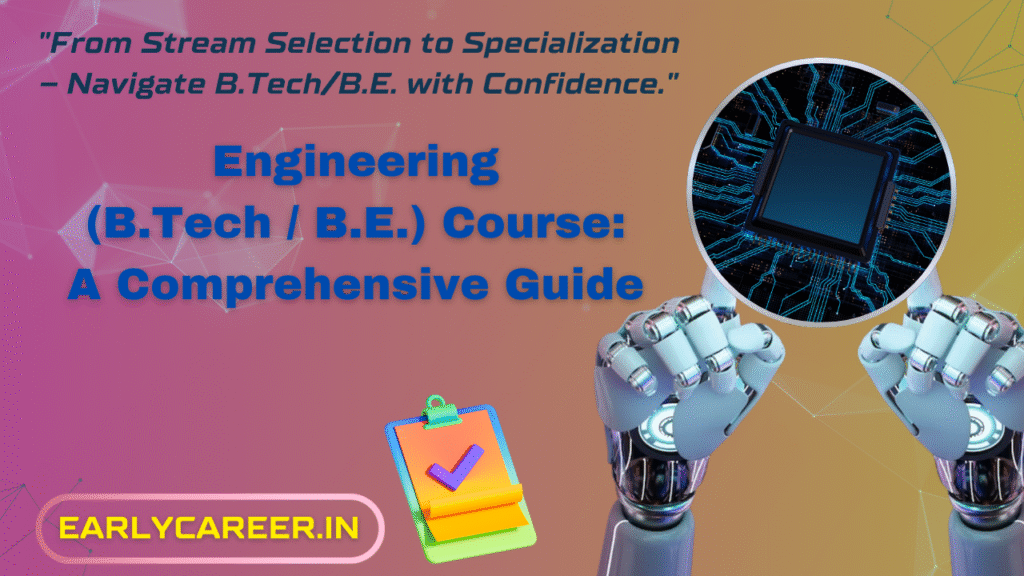
👤 By Dr. Nirbhay Kumar – Educational Consultant | Founder, Early Career Help
📘 Overview
Bachelor of Technology (B.Tech) and Bachelor of Engineering (B.E.) are four-year undergraduate programs that equip students with theoretical knowledge and practical skills in various engineering disciplines. While B.E. traditionally emphasizes theoretical concepts, B.Tech focuses more on practical applications; however, both degrees are considered equivalent in India and are recognized by the All India Council for Technical Education (AICTE) and the University Grants Commission (UGC).
🛠️ List of Engineering Streams & How to Choose
India offers a diverse range of engineering specializations. Here’s a list of prominent B.Tech/B.E. streams along with guidance on selecting the right one:
- Computer Science and Engineering (CSE): Ideal for those interested in software development, algorithms, and computer systems.
- Information Technology (IT): Focuses on information systems, networking, and data management.
- Electronics and Communication Engineering (ECE): Suitable for students keen on electronic devices, circuits, and communication equipment.
- Electrical Engineering (EE): Centers on electrical systems, power generation, and transmission.
- Mechanical Engineering (ME): Best for those fascinated by machines, thermodynamics, and manufacturing processes.
- Civil Engineering: Focuses on infrastructure development, including roads, bridges, and buildings.
- Chemical Engineering: Involves the study of chemical processes and production.
- Biotechnology: Combines biology and technology, suitable for careers in pharmaceuticals and research.
- Aerospace Engineering: Deals with the design and development of aircraft and spacecraft.
- Automobile Engineering: Focuses on vehicle design, manufacturing, and maintenance.
- Petroleum Engineering: Centers on the exploration and production of oil and gas.
- Agricultural Engineering: Applies engineering principles to agriculture for improved productivity.
- Environmental Engineering: Addresses environmental challenges through engineering solutions.
- Marine Engineering: Involves the design and maintenance of ship systems.
- Mining Engineering: Focuses on the extraction of minerals from the earth.
- Robotics and Automation: Combines mechanical, electrical, and computer engineering for automated systems.
- Data Science and Artificial Intelligence: Emerging fields focusing on data analysis and intelligent systems.
Choosing the Right Stream:
- Interest and Aptitude: Select a stream that aligns with your interests and strengths.
- Career Goals: Consider the long-term career prospects and industry demand.
- Industry Trends: Stay informed about emerging fields and technological advancements.
- Higher Studies: If planning for postgraduate studies, choose a stream that offers ample research opportunities.
🎓 Eligibility Criteria
Academic Qualifications:
- Standard Requirement: Completion of 10+2 (or equivalent) with Physics, Chemistry, and Mathematics (PCM) as core subjects.
- Minimum Marks: Generally, a minimum aggregate of 50% to 75% in PCM subjects is required, varying by institution and category.
Age Limit:
- Most institutions do not have an upper age limit; however, some entrance exams may specify age criteria.
📝 Entrance Examinations
Admission to B.Tech/B.E. programs is primarily through entrance examinations:
National-Level Exams:
- JEE Main: Conducted by the National Testing Agency (NTA) for admission to NITs, IIITs, and other centrally funded institutions.
- JEE Advanced: For candidates who qualify JEE Main and seek admission to IITs.
State-Level Exams:
- MHT-CET: For engineering colleges in Maharashtra.
- WBJEE: For institutions in West Bengal.
- KCET: For colleges in Karnataka.
Institutional Exams:
- VITEEE: Conducted by VIT University.
- BITSAT: For admission to BITS Pilani campuses.
- SRMJEEE: Conducted by SRM Institute of Science and Technology.
Direct Admission Based on Class 12 Marks:
Some private institutions offer direct admission based on Class 12 performance, especially for management quota seats.
🏫 Top Engineering Colleges in India
Indian Institutes of Technology (IITs):
- IIT Bombay
- IIT Delhi
- IIT Kanpur
- IIT Madras
- IIT Kharagpur
National Institutes of Technology (NITs):
- NIT Trichy
- NIT Surathkal
- NIT Warangal
Other Prestigious Institutions:
- Birla Institute of Technology and Science (BITS) Pilani
- Delhi Technological University (DTU)
- Vellore Institute of Technology (VIT)
- SRM Institute of Science and Technology
- Manipal Institute of Technology
📚 Course Structure
The B.Tech/B.E. curriculum is structured over eight semesters (four years), combining theoretical knowledge with practical applications.
Core Subjects:
- Engineering Mathematics
- Physics and Chemistry
- Basic Electrical and Electronics Engineering
- Engineering Mechanics
- Computer Programming
Specialization Subjects:
- Varies based on the chosen stream; for example, Data Structures and Algorithms for CSE, Thermodynamics for ME, etc.
Electives:
- Advanced topics like Artificial Intelligence, Machine Learning, Robotics, Cybersecurity, etc.
Laboratory Work:
- Hands-on experiments complementing theoretical studies.
Projects and Internships:
- Final-year projects and mandatory internships provide industry exposure.
💼 Job Prospects
B.Tech/B.E. graduates have diverse career opportunities across various sectors:
Information Technology (IT) and Software:
- Roles: Software Developer, System Analyst, Data Scientist, AI Engineer.
Core Engineering:
- Roles: Mechanical Engineer, Civil Engineer, Electrical Engineer, Chemical Engineer.
Public Sector and Government Jobs:
- Organizations like ISRO, DRDO, BHEL, and GAIL recruit engineering graduates.
Higher Studies:
- Options include M.Tech, MBA, or pursuing research through Ph.D. programs.
Entrepreneurship:
- Graduates can venture into startups or consultancy services.
Salary Expectations:
- Entry-level salaries range from ₹3 to ₹6 lakhs per annum, varying based on the institution, stream, and job role.
📝 Selection Process
- Entrance Exam Performance:
- Candidates are shortlisted based on their scores in relevant entrance examinations.
- Counseling Process:
- Qualified candidates participate in centralized counseling sessions where they select preferred colleges and streams.
- Seat Allotment:
- Seats are allocated based on merit, preferences, and availability.
- Document Verification and Admission:
- Candidates must verify their documents and pay the requisite fees to confirm admission.
Pursuing a B.Tech or B.E. degree in India offers a solid foundation for a rewarding career in engineering and technology. With a plethora of specializations and institutions to choose from, students can align their education with their interests and industry demands.
